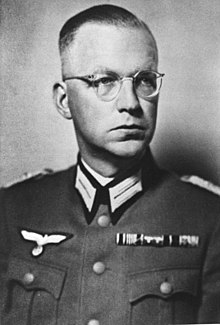Helmuth Groscurth
| Helmuth Groscurth | |
|---|---|

Groscurth as an Oberstleutnant, 1941
|
|
| Born |
December 16, 1898 Lüdenscheid, Germany |
| Died | April 7, 1943 (aged 44) Frolovo, USSR |
| Allegiance |
|
| Service/branch | Heer |
| Years of service | 1916–1920 1924-1943 |
| Rank | Oberst |
| Unit |
Abwehr 11th Army Corps |
| Commands held | Abwehr-Abteilung II Abteilung Heerwesen zbV (Abwehr) |
| Battles/wars |
Battles/Campaigns
World War I
World War II
|
| Awards | |
World War I
World War II
Helmuth Groscurth (December 16, 1898 – April 7, 1943) was a staff and Abwehr officer in the Wehrmacht and a member of the German resistance. As an intelligence officer he was an early proponent of the Brandenburgers and commanded unconventional warfare operations in the Sudetenland. He was actively involved in the conspiracy against Hitler's agenda while in the military intelligence apparatus before being reassigned to the regular army following his criticism of war crimes committed by German forces in the Poland. After commanding an infantry battalion in the invasion of France he took up a variety of staff roles. He was involved in the events of the Bila Tserkva massacre where he attempted to avert the killing of Jewish children. He ended his active service as Karl Strecker's Chief of Staff in the 11th Army Corps. He participated in the Battle of Stalingrad and helped draft the final message from the German forces trapped there. After the surrender he contracted Typhus and died while in Soviet captivity. The recovery of his diaries and papers were a significant source for historians researching the early resistance to Hitler within the German military.
Groscurth was a devout Protestant and conservative nationalist, born in Lüdenscheid to German theologian and priest, Reinhard Groscurth(). His older brother, also named Reinhard, was a German lawyer who worked against corruption and Nazi influence in the Evangelical Church of Bremen. Groscurth joined the German 75th Infantry Regiment in 1916 and fought on the Western Front where he was severely wounded and taken as a POW by the British the following year. After the war he transferred to the Reichswehr and then left the military to pursue studies in agriculture. He rejoined the Reichswehr in 1924 and in 1929 was appointed as the adjunct to Erwin von Witzleben, a fellow anti-Hitler conspirator who would go on to be executed for his participation in the 20 July plot.
...
Wikipedia
